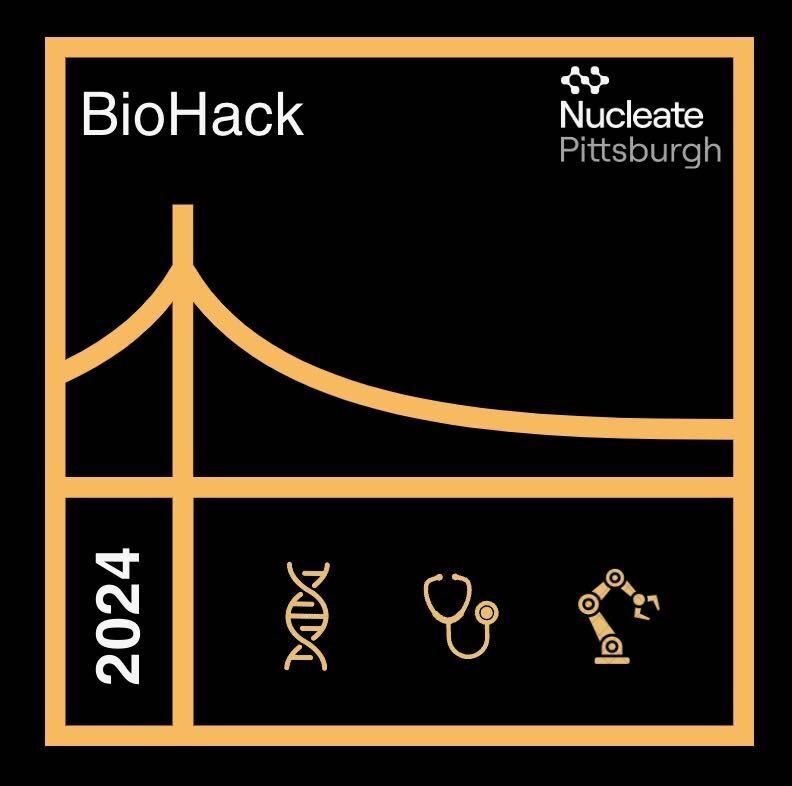
Scientific Breakthroughs in 36 Hours or Less?
In biotech or healthcare, research results can take years—but the benefits of hackathons extend far beyond immediate research results.
The Nucleate Pittsburgh BioHack—held October 25-27, 2024—is set to showcase the city’s young biotech talent—bringing together students, researchers and industry professionals to tackle real-world challenges in biotech and healthtech through innovative AI and machine learning solutions.
Hackathons originated in the late 1990s as a way to bring programmers together to collaborate intensively on software projects. The term “hackathon” itself is a blend of “hack” (in the sense of playful, exploratory programming) and “marathon.” The first widely recognized hackathon took place in June 1999 when 10 developers from OpenBSD gathered in Calgary, Canada, to tackle a specific cryptographic problem over a weekend. Shortly after, Sun Microsystems hosted a JavaOne conference hackathon, further popularizing the concept. Since then, hackathons have evolved from primarily software-focused events to encompass a wide range of disciplines, including biotech, hardware and AI. Today’s hackathons often include participants from diverse fields, and the scope has broadened to include solving complex, real-world problems in areas like health tech, sustainability and social innovation, reflecting a trend towards multidisciplinary collaboration and impact-driven outcomes.
Hackathons, especially in the life sciences, face an obvious question: Can meaningful research and innovation truly come from a two-day sprint? In areas like biotechnology or healthcare, where research timelines typically stretch over years or even decades, expecting breakthrough innovations from a short event seems overly ambitious. If so, do they have value beyond entertainment or education? Prognosis:Innovation interviewed judges and sponsors of the Pittsburgh 2024 event to better understand the value they derive from their participation.
It became clear that the benefits of hackathons extend far beyond immediate research results. As several interviewees emphasized, the true strength of these events lies in their ability to simulate real-world scenarios where time is limited, resources are constrained and creativity is crucial. Hackathons force participants to focus, prioritize and quickly distill complex problems into actionable solutions.
“The compressed timeframe pushes students and researchers out of their comfort zones, forcing them to apply their knowledge in practical, sometimes messy, ways. This kind of pressure creates an environment where quick learning and adaptability are valued.”
~Liam Krut, Investment Partner at Reinforced Ventures
These events become a proving ground for skills that are essential in the commercial world but are unfortunately rarely highlighted in academic settings.
Participants in hackathons gain exposure to industry expectations, the importance of clear and persuasive communication, and a deeper understanding of how to identify promising intellectual property. This aligns with Zak Slayback’s observation during our discussions:
“Hackathons are less about solving the big problems in one weekend and more about learning how to think like an entrepreneur—figuring out what’s commercially viable, what has market potential and what can attract investor interest.”
~Zak Slayback, Partner at 1517 Fund
Participants sharpen their ability to discern what matters in real-world applications, a skill that can only be developed through practice and exposure.
Educational Institutions and the Hackathon Gap
For educational institutions, hackathons offer an opportunity to bridge a long-standing gap between theoretical learning and practical application. Many universities struggle with how to teach skills like IP evaluation, business development, and real-world problem-solving—all areas that are essential for translating academic research into marketable solutions. Fiona Leng, Managing Partner at Xtal Ventures, pointed out the limitations of traditional academic environments, emphasizing that hackathons “…allow students to get their hands dirty, test out ideas in real time, and see what it takes to make an idea commercially viable. It’s the kind of education you can’t get from a textbook.”
By pivoting away from abstract research and focusing instead on application, participants develop skills identifying and refining potential intellectual property that has commercial viability.
For their own direct benefit, stakeholders see hackathons as an efficient way to promote innovation and talent retention—particularly in regions like Pittsburgh that are striving to build robust tech and biotech ecosystems. While acknowledging the limitations of a two-day event, many believe that the seeds planted during these brief, intense gatherings can have lasting impacts. As one participant noted, “The value isn’t in finishing a project—it’s in the connections you make, the ideas you explore, and the insights you gain. It’s about building momentum and creating a culture that values innovation.” Hackathons serve as a catalyst, initiating relationships between students, researchers and industry professionals that continue long after the weekend ends.
What Does Success Look Like?
To determine whether these events have a meaningful impact, stakeholders and observers need to look beyond the hackathon weekend itself. Future success will be indicated not by immediate research outcomes, but by the follow-up actions: Are the ideas generated at hackathons leading to prototypes, further research or even startups? Are participants continuing to engage with the networks they built during the event? Is there an increase in the quality and quantity of IP emerging from local universities, and are those ideas finding their way to market?
For Nucleate’s Pittsburgh chapter the answer is surprisingly easy: Success means more students signing up for chapter events and more sponsors engaging in the local ecosystem. The hope is that these events can create a pipeline where talented individuals learn to think commercially early in their careers, ultimately contributing to a more dynamic and entrepreneurial life sciences community.
Hackathons may not be capable of solving the biggest healthcare problems in two days, but they play a crucial role in preparing the next generation to take on those challenges, armed with a mindset that values both innovation and practicality. In the words of Zak Slayback, “It’s about finding those diamonds in the rough—students who don’t just think like academics but like founders. That’s where the real impact of a hackathon lies.”
Prognosis:Innovation will be on-site during Nucleate Pittsburgh’s 2024 BioHack and will provide a summary of the 3-day event afterward.

BioHack Pittsburgh
October 25-27, 2024
Competitive teams will compete in the Cloud Lab Challenge or the BioTech and HealthTech tracks. Visit the Nucleate Pittsburgh site for more details on programming, judges, prizes and logistics.





